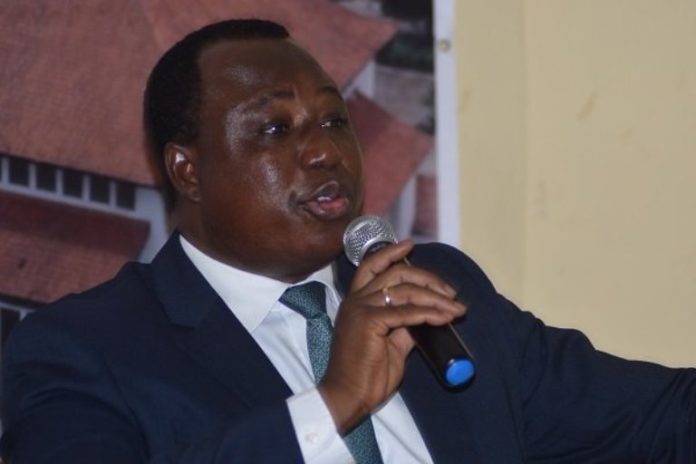The Commission on Human Rights and Administrative Justice (CHRAJ) has called for caution in the consideration of the anti-LGBTQI+ Bill currently before Parliament.
According to CHRAJ, Section 104 was already sufficient as it has already criminalised the acts of LGBTQI+.
It said if Section 104 was not enough in dealing with the issue, it is better to amend Section 104 than to introduce a whole new bill.
Appearing before the Parliamentary Committee currently engaged in a public hearing on the anti-LGBTQI bill on Monday the Commissioner of CHRAJ, Joseph Whittal, called for caution.
“Section 104, If there are limitations to 104, we can proceed to amend it instead of coming with a Bill that criminalises all over again.
“If the [Parliamentary] committee believes that the species of activities that are covered under Section 104 in the light of the fact that it is an old legislation, require further improvement by an amendment, that will take care of current and future possible activities, which you would want to criminalise, I said you should go ahead, and that is something you should be looking at instead of this [anti-LGBTQI+] Bill,” he added.
He expressed concerns on certain areas of the Bill which ought to be looked at in line with human rights in relation to international treaties Ghana has already signed on to.
“The Commission takes the view that section 104 has already criminalised the act, that is the position [of the law] so why then add provisions that will now bring other persons or people when they are to do [or] associate one way on the other just like it happened in Ho [Volta Region] into it, why?
“I think section 104 is sufficient and if it is not sufficient, we can make an amendment of that position sufficient to deter people along those lines and not to open up so that anyone of us, like me [Whittal] as a member of the commission or commissioner of CHRAJ with a mandate to promote human rights, if I decide to speak on behalf of minority and the vulnerable, then I’m opening myself to possible criminal prosecution, why will that be? We need to be careful as we consider the Bill.”
Ghana’s commitments internationally
Reacting to an argument earlier put forward by the promoters of the Bill that there was nothing wrong at the international level regarding Ghana’s commitments, Mr Whittal said:
“Again the promoters went a distance at trying to let you as a committee to appreciate that there is nothing wrong at the international level regarding the commitments of Ghana, in the Universal Declaration on Human Rights and other international instruments including the African Charter. I beg to differ.”
Because there are internal comments of the committee on economic, social and cultural rights committee, which have actually defined sexual orientation as a human right and by the way, Ghana has ratified it, without reservation.
ALSO READ:
“So what we can do as a nation should be, we have all the power to go back and make some reservations if we want. But to say that is not a human right, I say, once the committee on economic, social and cultural rights, Ghana is a member of the General Assembly of the UN, and is subject to the jurisdiction of that committee, and the general comments of that committee have included sexual orientation as a human right, we need to be very careful because it only takes the Supreme Court to import that into our law…, so let’s be very careful, I think since I’m not here to speak for or against, I’m only drawing attention, that if there are reservations that we have to make, we have to do that so that we know where we are trodding.
Education
The CHRAJ Commissioner said on the African Charter too, the promoters of the Bill picked some provisions and forgot certain provisions.
“If you look at Article 28 of the African Charter, the pivot of that provision is on tolerance and tolerating each other as Africans and as neighbours are very important if citizens are erring on the side of caution on one way or the other, it is about how we tolerate them, what steps we can take to ensure that they come back on the right road and Hon. Ursula Owusu was at pains drawing attention, which I agree with. Article 39 is very clear, the constitution looks forward to ways by which we can improve our culture from what we used to have because as defined by the same committee on economic, social and cultural rights, is not only looking at the past, it is expansive, it looks at the present and considers the future.
“So if there is the need for us to begin looking at certain cultural practices, including the practices that this Bill seeks to outlaw, or to prohibit, why don’t we take the non-criminal perspective, which is working, using institutions like NCCE and us [CHRAJ] among others to effect the necessary change,” he stressed.
He said the Bill should focus on promoting proper family values if that is what the promoters want, that CHRAJ and other bodies such as NCCE and the courts mentioned in the Bill will be prepared to engage.
He said CHRAJ can only integrate certain cultural practices if it is consistent with human rights. “We cannot under the mandate that we run, go and integrate certain cultural practices which you [Parliament] has legislated against but which seem to be human rights within the Ghanaian contest and the international contest.”

